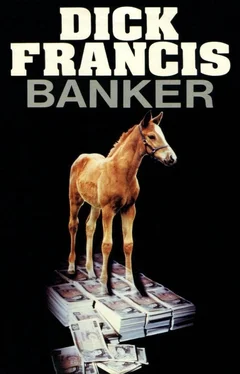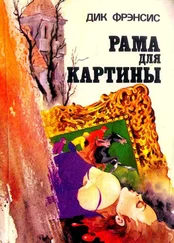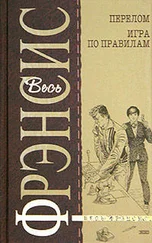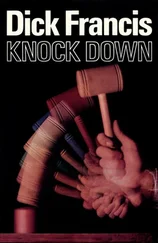Nigel arrived in the yard, and with his scarcely necessary help Lenny opened Sandcastle’s door and led the colt out; and one could see in all their strength the sleek muscles, the tugging sinews, the spring-like joints. The body that was worth its weight in gold pranced and scrunched on the hard apron, wheeling round impatiently and tossing its uncomprehending head.
‘Full of himself,’ Oliver explained. ‘We have to feed him well and keep him fairly fit, but of course he doesn’t get the exercise he used to.’
We stepped to one side with undignified haste to avoid Sandcastle’s restless hindquarters. ‘Has he... er... started work yet?’ I asked.
‘Not yet,’ Oliver said. ‘Only one of his mares has foaled so far. She’s almost through her foal-heat, so when she comes into use in fifteen or sixteen days time, she’ll be his first. After that there will be a pause — give him time to think! — then he’ll be busy until into June.’
‘How often...?’ I murmured delicately.
Oliver fielded the question as if he, like Calder, had had to give the same answer countless times over.
‘It depends on the stallion,’ he said. ‘Some can cover one mare in the morning and another in the afternoon and go on like that for days. Others haven’t that much stamina or that much desire. Occasionally you get very shy and choosy stallions. Some of them won’t go near some mares but will mate all right with others. Some will cover only one mare a fortnight, if that. Stallions aren’t machines, you know, they’re individual like everyone else.’
With Nigel in attendance Lenny led Sandcastle out of the yard, the long bay legs stalking in powerful strides beside the almost trotting little man.
‘Sandcastle will be all right with mares,’ Oliver said again firmly. ‘Most stallions are.’
We stopped for Oliver to give two carrots and a pat each to Rotaboy and Diarist, so that we didn’t ourselves see the calamity. We heard a distant clatter and a yell and the thud of fast hooves, and Oliver went white as he turned to run to the disaster.
I followed him, also sprinting.
Lenny lay against one of the white painted posts of the small paddock’s rails, dazedly trying to pull himself up. Sandcastle, loose and excited, had found his way into one of the paths between the larger paddocks and from his bolting speed must have taken the rails to be those of a racecourse.
Nigel stood by the open gate of the small paddock, his mouth wide as if arrested there by shock. He was still almost speechless when Oliver and I reached him, but had at least begun to unstick.
‘For Christ’s sake,’ Oliver shouted. ‘Get going. Get the Land Rover. He can get out onto the road that way through the Watcherleys’. He ran off in the direction of his own house leaving a partially resurrected Nigel to stumble off towards the bungalow, half in sight beyond the stallion yard.
Lenny raised himself and began his excuses, but I didn’t wait to listen. Unused to the problem and ignorant of how best to catch fleeing horses, I simply set off in Sandcastle’s wake, following his path between the paddocks and seeing him disappear ahead of me behind a distant hedge.
I ran fast along the grassy path between the rails, past the groups of incurious mares in the paddocks, thinking that my brief January holiday skiing down the pistes at Gstaad might have its practical uses after all; there was currently a lot more muscle in my legs than was ever to be found by July.
Whereas on my last visit the hedge between Oliver Knowles’ farm and the Watcherleys’ run-down hospital for sick horses had been a thorny unbroken boundary, there were now two or three wide gaps, so that passing from one side to the other was easy. I pounded through the gap which lay straight ahead and noticed almost unconsciously that the Watcherleys’ dilapidation had been not only halted but partially reversed, with new fencing going up and repairs in hand on the roofs.
I ran towards the stable buildings across a thistly field in which there was no sign of Sandcastle, and through an as yet unmended gate which hung open on broken hinges on the far side. Beyond there between piles of rubble and rusting iron I reached the yard itself, to find Ginnie looking around her with unfocused anxiety and a man and a girl walking towards her enquiringly.
Ginnie saw me running, and her first instinctively cheerful greeting turned almost at once to alarm.
‘What is it?’ she said. ‘Is one of the mares out?’
‘Sandcastle.’
‘Oh no...’ It was a wail of despair. ‘He can get on the road.’ She turned away, already running, and I ran after her; out of the Watcherleys’ yard, round their ramshackle house and down the short weedy gateless drive to the dangerous outside world where a car could kill a horse without even trying.
‘We’ll never catch him,’ Ginnie said as we reached the road. ‘It’s no use running. We don’t know which way he went.’ She was in great distress: eyes flooding, tears on her cheeks. ‘Where’s Dad?’
‘I should think he’s out in his car, looking. And Nigel’s in a Land Rover.’
‘I heard a horse gallop through the Watcherleys’,’ she said. ‘I was in one of the boxes with a foal. I never thought... I mean, I thought it might be a mare...’
A speeding car passed in front of us, followed closely by two others doing at least sixty miles an hour, one of them dicily passing a heavy articulated lorry which should have been home in its nest on a Sunday. The thought of Sandcastle loose in that battlefield was literally goose-pimpling and I began for the first time to believe in his imminent destruction. One of those charging monsters would be sure to hit him. He would waver across the road into their path, swerving, rudderless, hopelessly vulnerable... a five million pound traffic accident in the making.
‘Let’s go this way,’ I said, pointing to the left. A motorcyclist roared from that direction, head down in a black visor, going too fast to stop.
Ginnie shook her head sharply. ‘Dad and Nigel will be on the road. But there’s a track over there...’ She pointed slantwise across the road. ‘He might just have found it. And there’s a bit of a hill and even if he isn’t up there at least we might see him from there... you can see the road in places... I often ride up there.’ She was off again, running while she talked, and I fell in beside her. Her face was screwed up with the intensity of her feelings and I felt as much sympathy for her as dismay about the horse. Sandcastle was insured — I’d vetted the policy myself — but Oliver Knowles’ prestige wasn’t. The escape and death of the first great stallion in his care would hardly attract future business.
The track was muddy and rutted and slippery from recent rain. There were also a great many hoofprints, some looking new, some overtrodden and old. I pointed to them as we ran and asked Ginnie pantingly if she knew if any of those were Sandcastle’s.
‘Oh.’ She stopped running suddenly. ‘Yes. Of course. He hasn’t got shoes on. The blacksmith came yesterday, Dad said...’ She peered at the ground dubiously, ‘... he left Sandcastle without new shoes because he was going to make leather pads for under them... I wasn’t really listening.’ She pointed. ‘I think that might be him. Those new marks... they could be, they really could.’ She began running again up the track, impelled by hope now as well as horror, fit in her jeans and sweater and jodhpur boots after all that compulsory jogging.
I ran beside her thinking that mud anyway washed easily from shoes, socks and trouser legs. The ground began to rise sharply and to narrow between bare-branched scratchy bushes; and the jumble of hoof marks inexorably led on and on.
‘Please be up here,’ Ginnie was saying. ‘Please, Sandcastle, please be up here.’ Her urgency pumped in her legs and ran in misery down her cheeks. ‘Oh please... please ...’
Читать дальше




